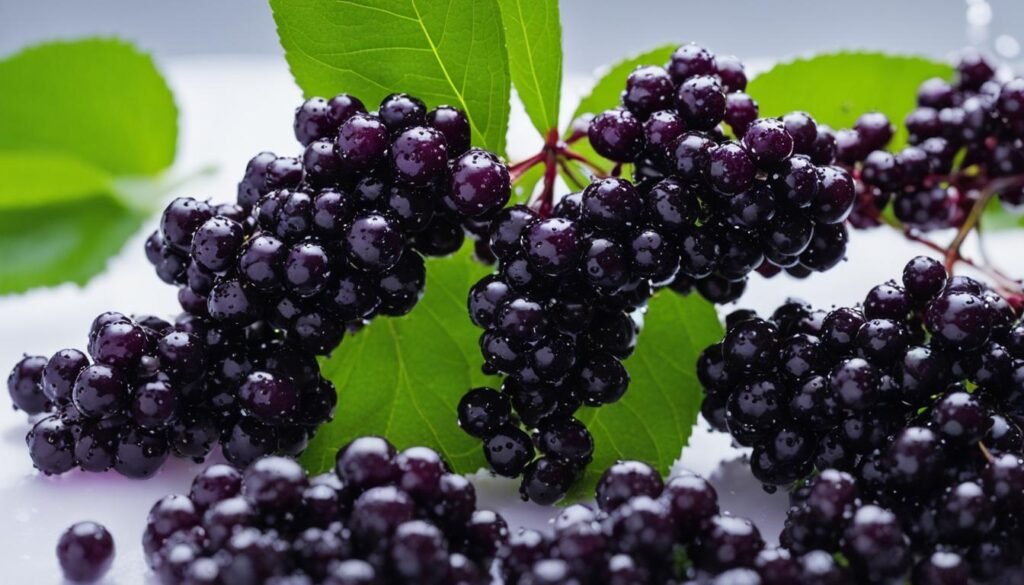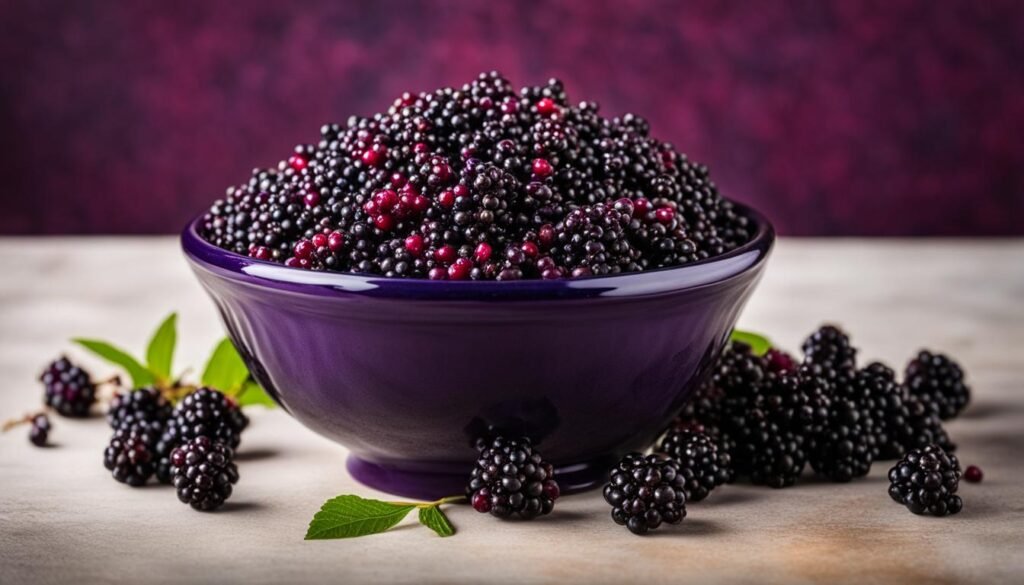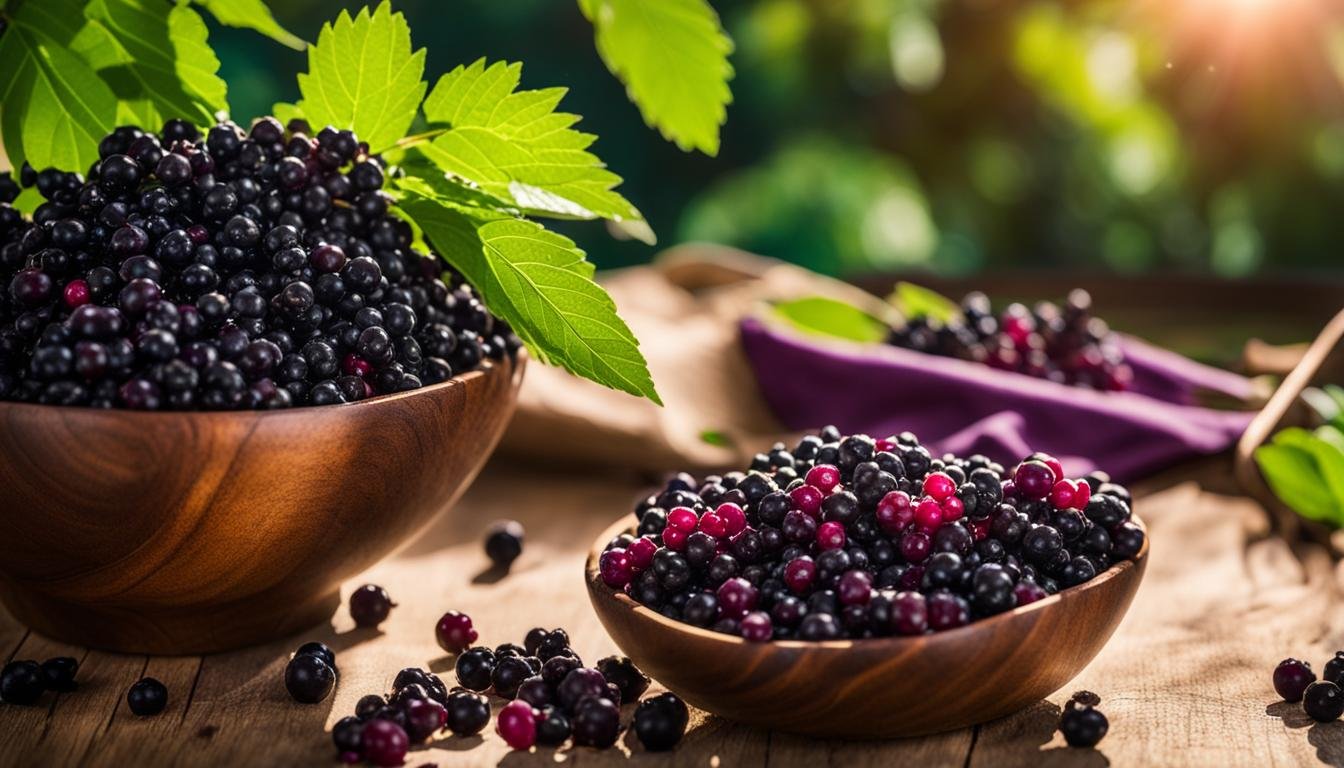Welcome to my blog, where I’ll be sharing my secrets to wellness and diving into the amazing benefits of elderberry. Elderberry, also known as Sambucus nigra, is a dark purple berry that is packed with health benefits. From immune support to its rich antioxidant content, elderberry has become a popular choice for those looking to boost their wellness routine.
Before we explore the benefits of elderberry, it’s important to note that research on this berry is still limited. However, many people have found relief from symptoms of the flu and other respiratory infections when incorporating elderberry into their routine. Its potential as a natural remedy is quite promising.
Not only is elderberry a delicious addition to your diet, but it is also a nutrient powerhouse. It’s loaded with fiber, vitamin C, iron, and potassium, making it a great choice for overall health and wellness.
Key Takeaways:
- Elderberry, also known as Sambucus nigra, offers potential health benefits.
- Research on elderberry is still limited, but it has shown promise in relieving symptoms of the flu and other respiratory infections.
- Elderberry is packed with essential nutrients like fiber, vitamin C, iron, and potassium.
What is Elderberry?
Elderberry, scientifically known as Sambucus nigra, is a dark purple fruit that grows on the elder tree. It is rich in antioxidants called anthocyanins, which give it its deep purple color. These antioxidants help reduce cell damage caused by free radicals and promote overall health.
Elderberry is often used for immune support and is marketed for its potential benefits against viral infections like the common cold and flu.

In text must include SEO relevant keywords – elderberry, Sambucus nigra, antioxidants, anthocyanins.
Potential Uses of Elderberry
Elderberry is a versatile fruit that has garnered attention for its potential uses in supporting the immune system and promoting overall well-being. With its rich antioxidant content and potential to reduce the severity and duration of respiratory infections, elderberry has become a popular choice for those seeking natural immune support.
One of the key potential uses of elderberry is its ability to support immune function. The antioxidants found in elderberry, including anthocyanins, help to reduce cell damage caused by harmful free radicals. This, in turn, can strengthen the immune system and enhance its ability to combat infections and illnesses.
Elderberry’s immune-supporting properties make it particularly beneficial during cold and flu season. While elderberry cannot prevent infection, it may help alleviate symptoms and shorten the duration of respiratory infections like the common cold and flu. Research suggests that elderberry may have antiviral properties and can help reduce inflammation in the respiratory system, providing relief from symptoms such as coughing and congestion.
“Elderberry’s potential uses in supporting the immune system and relieving symptoms of respiratory infections make it an attractive natural remedy.”
Elderberry’s high antioxidant content further contributes to its potential health benefits. Antioxidants are known for their ability to neutralize free radicals and protect cells from damage. By reducing oxidative stress, elderberry may help promote overall health and well-being.
While elderberry has been traditionally used for centuries, it is important to note that most proposed uses of elderberry have not been supported by extensive scientific research. While elderberry may offer potential health benefits, more studies are needed to fully understand its range of uses and its impact on specific health conditions.
Potential Benefits of Elderberry:
- Supporting immune function
- Reducing the severity and duration of respiratory infections
- Providing relief from cold and flu symptoms
- Boosting antioxidant levels
It’s worth mentioning that caution should be exercised when using elderberry, as certain populations may need to avoid its use. Pregnant and breastfeeding individuals, children under 5 years old, and those with autoimmune diseases should consult with a healthcare professional before incorporating elderberry into their wellness routine.
| Potential Uses | Evidence |
|---|---|
| Supporting immune system | Limited research suggests immune-supporting properties |
| Reducing severity and duration of respiratory infections | Preliminary evidence shows potential benefits |
| Relieving cold and flu symptoms | Possible symptom relief, but not a preventive measure |
While the potential uses of elderberry are promising, it is always important to consult with a healthcare professional before starting any new supplements or natural remedies, especially if you have underlying health conditions or are taking medications. They can provide personalized guidance based on your individual needs and help ensure the safe and appropriate use of elderberry.
As further research is conducted, we hope to gain more insight into the extensive potential uses of elderberry and unlock its full benefits for human health.

Nutritional Profile of Elderberry
Elderberries are not only delicious but also packed with essential vitamins, minerals, and antioxidants that contribute to overall health and well-being. Let’s take a closer look at the nutritional profile of elderberry:
| Nutrient | Amount per Cup of Elderberries |
|---|---|
| Calories | 106 |
| Carbohydrates | 27 grams |
| Fiber | 10 grams |
| Vitamin C | 52 milligrams |
| Iron | 2.3 milligrams |
| Potassium | 406 milligrams |
In addition to these nutrients, elderberries are also rich in antioxidants, particularly anthocyanins. These antioxidants help protect the body against cell damage and promote overall health.
However, it’s important to note that while elderberry supplements can be beneficial for some individuals, they should be individualized and vetted by a healthcare professional. It’s vital to understand that no supplement is intended to treat, cure, or prevent any disease or condition.

Research Findings on Elderberry
“A systematic review from 2021 indicates that elderberry may be a safe option for reducing the severity and duration of respiratory infections.”
“A 2020 study did not find black elderberry to improve symptoms or reduce the duration of illness.”
“In a 2019 study, elderberry appeared to reduce the duration of upper airway symptoms caused by the flu when taken at the onset of symptoms.”
“A 2016 study on airline passengers showed that elderberry extract led to milder symptoms and fewer sick days from cold illnesses, but it did not prevent infection.”
Safety and Dosage of Elderberry
When it comes to using elderberry, safety should always be a priority. While elderberry is generally considered safe for up to 12 weeks, it is important to note that there is limited safety data available for certain populations. It is crucial to be aware of any potential risks and take appropriate precautions.
First and foremost, pregnant and breastfeeding individuals should avoid consuming elderberry. The effects of elderberry on pregnancy and lactation have not been extensively studied, so it is best to err on the side of caution.
Additionally, children under 5 years old should not be given elderberry. Their immune systems are still developing, and there is a lack of research on the safety and efficacy of elderberry in this age group.
Furthermore, individuals with autoimmune diseases should exercise caution when considering elderberry consumption. Elderberry has the potential to stimulate the immune system, which could potentially worsen the symptoms of autoimmune disorders. It is always advisable to consult with a healthcare professional before using elderberry if you have an autoimmune condition.
The dosing of elderberry can vary depending on the product and the purpose of use. There is no standard recommendation for elderberry dosage, as research studies have used different amounts. It is important to carefully read and follow the dosage directions provided on the product label. Consulting with a healthcare professional can also provide guidance on appropriate dosing for your individual needs.
Remember to store elderberry supplements in a cool, dry place, and keep them out of reach of children and pets. Proper storage helps maintain the quality and potency of the product over time.
Overall, while elderberry offers potential benefits, it is essential to prioritize safety and consult with a healthcare professional before incorporating it into your wellness routine.
| Elderberry Safety Precautions | Elderberry Dosage Recommendations |
|---|---|
| – Pregnant and breastfeeding individuals should avoid elderberry consumption. | – Follow the dosage directions provided on the product label. |
| – Children under 5 years old should not be given elderberry. | – Consult with a healthcare professional for personalized dosing advice. |
| – Use caution if you have autoimmune diseases. | – Store elderberry supplements in a cool, dry place. |
| – Keep elderberry supplements out of reach of children and pets. |

Other Potential Benefits of Elderberry
While elderberry is most commonly associated with immune support, there are other potential benefits that have been suggested but require further research. Elderberry has been promoted for its anti-inflammatory properties, potential pain relief, and even cholesterol management. However, there is not enough evidence to support these claims, and dietary supplements should not be used to treat conditions or diseases.
“Elderberry has shown promising anti-inflammatory properties in preliminary studies. It contains compounds that may help reduce inflammation in the body, which could potentially benefit individuals with chronic inflammatory conditions. However, more research is needed to fully understand the extent of elderberry’s anti-inflammatory effects.”
Elderberry’s potential benefits in pain relief may be linked to its anti-inflammatory properties. Inflammation is often associated with pain, and reducing inflammation could alleviate discomfort in certain conditions. However, more research is required to determine the specific mechanisms through which elderberry may contribute to pain relief.
Additionally, some studies suggest that elderberry may have a positive impact on cholesterol levels. Elderberry contains flavonoids that have been shown to improve lipid profiles and potentially aid cholesterol management. However, further research is needed to establish specific dosage recommendations and evaluate the long-term effects on cholesterol levels.

| Precautions of Elderberry | Interactions |
|---|---|
| Elderberry plant contains sambunigrin, a potentially toxic substance that can release cyanide into the body. | Elderberry may interact with immunosuppressant medications. |
| Ripe and cooked elderberries do not contain sambunigrin and are safe to consume. | Consult with a healthcare professional before using elderberry if you are taking immunosuppressants or have an autoimmune disease. |
Elderberry Supplements and Products
Elderberry supplements and products offer a convenient and versatile way to incorporate the benefits of elderberry into your daily routine. There are various forms of elderberry available, catering to different preferences and needs. Here are some common forms of elderberry products:
- Syrups: Elderberry syrups are a popular choice, often consumed directly or added to beverages. They provide a concentrated dose of elderberry.
- Teas: Elderberry teas offer a soothing and comforting way to enjoy the benefits of elderberry. They can be enjoyed hot or cold.
- Capsules: Elderberry capsules provide a convenient option for those who prefer a standardized dosage. They are available in various strengths.
- Gummies: Elderberry gummies are a fun and tasty option, particularly for children or those who have difficulty swallowing pills.
- Tonics: Elderberry tonics are often mixed with other immune-supporting ingredients, such as herbs and botanicals, to create a powerful wellness blend.
- Tinctures: Elderberry tinctures are liquid extracts that can be taken orally or added to beverages. They offer a concentrated form of elderberry.
- Topical Ointments: Elderberry ointments are designed for external use and may provide benefits for skin health and minor skin irritations.
In addition to individual elderberry supplements, you can find elderberry combined with other nutrients like vitamin C, zinc, vitamin A, or vitamin E. These combinations provide added benefits and synergistic effects for overall wellness.
When purchasing elderberry supplements and products, it is essential to choose high-quality products from reputable brands. Due to the lack of regulation in the dietary supplement industry, third-party testing is strongly recommended to ensure the product’s quality and authenticity. Look for brands that prioritize transparency and provide detailed information about their sourcing, manufacturing processes, and quality control measures.
Remember, dietary supplements should never be used as a substitute for a balanced diet and healthy lifestyle. They are intended to complement your overall wellness journey and should be taken in consultation with a healthcare professional, especially if you have underlying health conditions or are taking medications.

Considerations for Elderberry Purchases
When it comes to purchasing elderberry products, there are important factors to consider in order to make informed decisions. The dietary supplement industry lacks regulation, leading to concerns about the quality and authenticity of elderberry products.
“Many elderberry products on the market did not actually contain elderberry and were mixed with other ingredients.”
One study revealed that a significant number of elderberry products available in the market did not contain the actual elderberry fruit but were instead mixed with other undisclosed ingredients. This highlights the need for vigilance and scrutiny when selecting elderberry products.
To ensure the quality and authenticity of elderberry purchases, it is highly recommended to choose products that have undergone third-party testing. Third-party testing provides an unbiased assessment of the product’s contents, confirming the presence of genuine elderberry and validating the product’s claims.
The USP Forum on Elderberry Standards
The United States Pharmacopeia (USP) recognized the concerns surrounding elderberry products and held a forum in 2021 to address the need for standards in the development and manufacturing of elderberry products. The aim of this forum was to establish guidelines and best practices that supplement companies can follow to ensure the quality and efficacy of their elderberry products.
These standards would create a framework for the industry, helping consumers make more informed choices and promoting transparency and accountability among supplement manufacturers.
Comparison of Elderberry Products
| Brand | Product Type | Third-Party Tested |
|---|---|---|
| Brand A | Syrup | Yes |
| Brand B | Capsules | No |
| Brand C | Tincture | Yes |
| Brand D | Gummies | Yes |
The table above provides a comparison of different elderberry products offered by various brands. It highlights whether each product has undergone third-party testing, indicating their commitment to quality and transparency. When purchasing elderberry products, it is advisable to choose those that have been third-party tested to ensure their authenticity and purity.
By being mindful of these considerations and seeking out reputable brands that prioritize product quality, consumers can make more confident and informed elderberry purchases.
Elderberry and Gut Health
Elderberry has gained significant attention for its potential benefits in supporting gut health. A healthy gut is essential for proper digestion, nutrient absorption, and a strong immune function. Research suggests that elderberry may play a role in enhancing digestive function, promoting a balanced gut microbiota, and reducing gut inflammation.
Promoting Digestive Function
Elderberry has been found to have beneficial effects on digestive function. It may help relieve constipation by promoting regular bowel movements. The fiber content in elderberry contributes to improved bowel regularity, ensuring that waste is efficiently eliminated from the body and minimizing discomfort.
Enhancing the Gut Microbiota
The gut microbiota, or the collection of microorganisms in the digestive tract, plays a critical role in maintaining overall gut health. Elderberry has shown promise in enhancing the gut microbiota by combating harmful bacteria and promoting the growth of beneficial bacteria. This helps maintain a healthy balance of gut flora, which is crucial for optimal digestion and immune function.
Reducing Gut Inflammation
Elderberry possesses anti-inflammatory properties that may help reduce inflammation in the gut. Chronic inflammation in the digestive system can disrupt the normal functioning of the gut and contribute to various digestive disorders. The anti-inflammatory properties of elderberry may help alleviate gut inflammation, supporting overall gut health.
Incorporating elderberry into your diet or taking elderberry supplements may offer potential benefits for promoting gut health. However, it is important to note that more research is needed to fully understand the mechanisms and specific effects of elderberry on gut health.
Next, I will discuss the impact of elderberry on the gut barrier and its connection to immune function.
Elderberry’s Impact on the Gut Barrier
The gut barrier, also known as the intestinal barrier, plays a crucial role in maintaining overall health by preventing harmful substances from entering the bloodstream. Maintaining a strong gut barrier is essential for promoting gut health and optimal digestive function.
Elderberry extract has been found to have a positive impact on the gut barrier by reducing intestinal permeability, which refers to the ability of the intestines to control the passage of molecules and substances. By reducing intestinal permeability, elderberry helps to preserve the integrity of the gut and prevent the entry of harmful substances into the bloodstream.
Elderberry’s ability to strengthen the gut barrier is believed to be due to its rich antioxidant content, specifically anthocyanins. These antioxidants help combat oxidative stress and inflammation in the gut, contributing to the overall health of the digestive system.
Elderberry and Gut Microbiota
In addition to strengthening the gut barrier, elderberry also has antimicrobial and prebiotic-like properties. These properties contribute to a balanced and diverse gut microbiota, which is crucial for optimal gut health.
The gut microbiota refers to the community of microorganisms residing in the digestive tract. A healthy and diverse gut microbiota supports proper digestion, nutrient absorption, and immune function. Elderberry’s antimicrobial properties have been shown to combat harmful bacteria in the gut, while its prebiotic-like properties promote the growth of beneficial bacteria.
The gut barrier serves as the first line of defense for our overall health. By strengthening the gut barrier and promoting a healthy gut microbiota, elderberry offers potential benefits for gut health and digestive function.
Elderberry’s Anti-Inflammatory Properties
Inflammation in the gut can disrupt the function of the gut barrier and contribute to various digestive disorders. Elderberry has been found to possess anti-inflammatory properties, which may help reduce inflammation in the gut and promote gut health.
Chronic inflammation in the gut can lead to increased intestinal permeability and compromised gut barrier function. By reducing inflammation, elderberry may help maintain the integrity of the gut barrier and support overall gut health.
Further research is needed to fully understand the mechanisms behind elderberry’s impact on the gut barrier and gut health. However, the existing evidence suggests that elderberry can play a beneficial role in maintaining the health and function of the digestive system.
Image related to the gut barrier and elderberry:

Elderberry and Immune Function
The gut and the immune system are closely interconnected, and elderberry’s impact on gut health may indirectly contribute to immune function. A robust immune system helps protect the gut from harmful pathogens and supports overall gut function. Elderberry’s immune-boosting properties, including its high antioxidant content and modulation of the immune response, are believed to enhance immune function.
While research on elderberry’s specific effects on the immune system is limited, its potential benefits are promising. The antioxidants present in elderberry, particularly anthocyanins, help reduce oxidative stress and inflammation in the body. These compounds can support immune cell function and help fight off infections.
One study found that elderberry extract increased the production of cytokines, which are proteins that play a crucial role in regulating immune responses. Elderberry has also been shown to inhibit the replication of certain viruses, reducing their ability to infect cells and spread throughout the body.
However, it is important to note that further research is needed to fully understand the mechanisms behind elderberry’s impact on immune health. While elderberry is generally considered safe for most people, it is always a good idea to consult with a healthcare professional before incorporating it into your routine, especially if you have any underlying health conditions or are taking medications.
In summary, elderberry’s potential role in supporting immune function is an area of growing interest. Its immune-boosting properties, coupled with its impact on gut health, make it a valuable addition to a balanced and healthy lifestyle. However, more research is needed to fully comprehend the extent of elderberry’s effects on immune health.
Elderberry’s Impact on Immune Function
| Study | Findings |
|---|---|
| Study 1 | Elderberry extract increased cytokine production, supporting immune response. |
| Study 2 | Elderberry inhibited the replication of certain viruses, reducing their infectivity. |
| Study 3 | The high antioxidant content of elderberry contributed to reducing oxidative stress and inflammation in the body. |
Note: These findings are based on preliminary research and further studies are needed to confirm and expand on these results.
Conclusion
In conclusion, elderberry provides a range of potential benefits for immune support, digestive health, and overall well-being. While research on elderberry is limited, it has shown promising results in relieving symptoms of the flu and other respiratory infections, thanks to its nutrient and antioxidant content. However, caution should be exercised, and certain populations, such as pregnant and breastfeeding individuals, children under 5 years old, and those with autoimmune diseases, should avoid elderberry consumption. It is important to consult with a healthcare professional to determine the appropriate dosage and form of elderberry supplements.
Elderberry can be a valuable addition to a healthy lifestyle, offering potential advantages for immune function and digestive well-being. Its potential benefits on gut health, including promoting regular bowel movements, strengthening the gut barrier, and supporting a balanced gut microbiota, further enhance its appeal. However, it is crucial to note that elderberry should not be used as a substitute for medical treatment or as a cure for any particular condition. Further research is necessary to comprehensively understand the full scope of elderberry’s benefits and its potential effects on various health aspects.
Overall, incorporating elderberry into a well-rounded and balanced approach to wellness may offer potential advantages. However, it is essential to make informed decisions, be mindful of any precautions, and seek appropriate professional guidance when considering the use of elderberry supplements. By doing so, individuals can maximize the potential benefits of elderberry while prioritizing their health and well-being.
FAQ
What are the health benefits of elderberry?
Elderberry is rich in antioxidants, which help reduce cell damage caused by free radicals. It is often used for immune support and may relieve symptoms of respiratory infections like the common cold and flu. However, research on elderberry is limited.
What is elderberry?
Elderberry, scientifically known as Sambucus nigra, is a dark purple fruit that grows on the elder tree. It is rich in antioxidants called anthocyanins, which give it its deep purple color.
What are the potential uses of elderberry?
Elderberry is often used for immune support and is marketed for its potential benefits against viral infections like the common cold and flu. It is also a good source of antioxidants, which promote overall health.
What is the nutritional profile of elderberry?
Elderberry is a good source of nutrients like fiber, vitamin C, iron, and potassium. One cup of elderberries contains approximately 106 calories, 27 grams of carbohydrates, and 10 grams of fiber.
What does research say about elderberry?
Research on elderberry suggests that it may relieve symptoms and reduce the duration of respiratory infections like the common cold and flu. However, more research is needed to fully understand its potential benefits.
Is elderberry safe to use?
Elderberry is generally considered safe for up to 12 weeks. However, it should be avoided by pregnant and breastfeeding individuals, children under 5 years old, and those with autoimmune diseases. It is important to consult with a healthcare professional before taking elderberry.
Does elderberry have other potential benefits?
Elderberry has been suggested to have anti-inflammatory properties and potential pain relief. However, more research is needed to support these claims, and dietary supplements should not be used to treat conditions or diseases.
What precautions should I take with elderberry?
The bark, leaves, and roots of the elderberry plant contain a potentially toxic substance. Ripe and cooked elderberries do not contain this substance. It may also interact with certain medications. It is important to consult with a healthcare professional before taking elderberry.
What forms of elderberry are available?
Elderberry is available in various forms, including syrups, teas, capsules, gummies, tonics, tinctures, and topical ointments. It can also be found as a single supplement or in combination with other nutrients.
What should I consider when purchasing elderberry products?
It is important to choose high-quality products from reputable brands. Due to a lack of regulation in the dietary supplement industry, third-party testing is recommended to ensure product quality.
How does elderberry impact gut health?
Elderberry may boost digestive function by relieving constipation and promoting regular bowel movements. It may also enhance the gut microbiota by combating harmful bacteria and promoting the growth of beneficial bacteria.
How does elderberry strengthen the gut barrier?
Elderberry extract has been found to reduce intestinal permeability, preserving the integrity of the gut. This strengthens the gut barrier and promotes gut health.
How does elderberry impact immune function?
The gut and immune system are closely interconnected, and elderberry’s impact on gut health may indirectly contribute to immune function. Elderberry’s high antioxidant content and modulation of the immune response are believed to enhance immune function.




